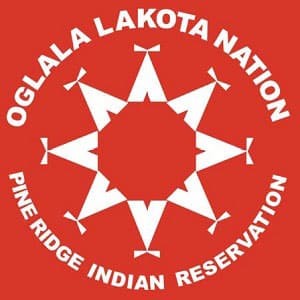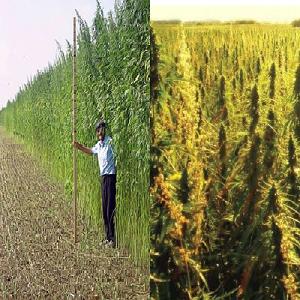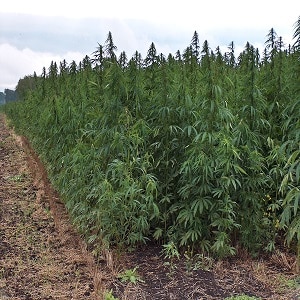 Hemp And The Story Of The Oglala Lakota Nation (Pine Ridge)
Hemp And The Story Of The Oglala Lakota Nation (Pine Ridge)
I admit, I don’t know as much about hemp as I wish I did. I know that it’s an amazing, undervalued crop, but I’m still learning more everyday. Fortunately I watched the movie Hempsters once upon a time, which dispelled a lot of myths that I had heard over the years and gave me a great hemp knowledge foundation to work from. One of the most dynamic stories that I heard about in the film was of the Oglala Lakota Nation, and their attempts to grow hemp to raise money for their tribe.
Sadly, the DEA refused to let it happen, despite the fact that it clearly violated the treaty that was formed with the Lakota Nation. There hasn’t been much news as far as their fight for awhile. In fact, I had to set the Google news search parameters all the way to 2007 to get the story below. It is from the North American Industrial Hemp Council Inc., and gives a good explanation about the hemp battle at Pine Ridge:
Oglala Lakota Nation Asserts Treaty Rights to S.D. US Attorney in Industrial Hemp Dispute
Pine Ridge, SD — A July 18, 2001 letter from John Yellow Bird Steele, President of the Oglala Lakota Nation (Pine Ridge), to Michelle Tapken, US Attorney for South Dakota, asserts the Indian nation’s right to grow industrial hemp under provisions of the Fort Laramie Treaty of 1868. (Click Here for copy of the letter.) This assertion is a direct challenge to the US government’s implication that the Controlled Substances Act (CSA) of 1970 abrogates provisions of the 1868 treaty.
The DEA cut down the first industrial hemp crop at Pine Ridge in a widely publicized raid on August 24th, 2000, conducted under the auspices of the CSA. The treaty of 1868 gave the Lakota Indian nations the mandate to grow food and fiber crops, effectively switching their livelihood to an agricultural base, which is generally recognized as part of the treaty’s original intent. Hemp was commonly grown in the United States at the time of the Fort Laramie Treaty.
The Controlled Substances Act of 1970 is a federal statute that criminalized the production, manufacture, and distribution of controlled substances, including marijuana. The CSA defined marijuana without distinction from industrial hemp. Legislation in various states in recent years (including Nebraska, Kentucky, Dakotas’, and Hawaii among others has sought to distinguish between industrial hemp and marijuana by defining hemp in terms of its low tetrahydrocannabinol (THC) content. THC is the psychoactive chemical in marijuana.
On July 28th, 1998, the Lakota Nation passed an ordinance that defined industrial hemp as Cannabis sativa plants containing less than 1 percent THC by weight, the same definition used in legislation seeking to legalize industrial hemp in various states. The ordinance did not affect the existing illegal status of marijuana in the Oglala Lakota Nation.
Laws like the CSA are not applicable to Indians unless the act expressly states that it applies to Indians and that it is abrogating any treaty right the Indians may have. However, before ever getting to the treaty, the Lakota have a reserved right to grow industrial hemp by virtue of their sovereignty preexisting that of the U. S. Government. Therefore, the Lakota argue that the CSA is inapplicable to its citizens and does not preempt an Indian’s right to engage in agriculture, including the growing of industrial hemp, under the Fort Laramie Treaty.
The Oglala Lakota Nation, in the July 18th letter to the US Attorney’s office, argue that the “Controlled Substances Act of 1970 did not divest the Lakota People of our reserved right to plant and harvest whatever crop we deem beneficial to our reservation. Therefore, we regard the enforcement of our hemp ordinance and prosecution of our marijuana laws as tribal matters to be handled by our Oglala Sioux Tribal Public Safety Law Enforcement Services.”
The harvest season for industrial hemp takes place during August. The US Attorney for South Dakota has recently asserted that any individual continuing to grow hemp on the Pine Ridge Reservation will be prosecuted with penalties of minimum ten years to life in prison. The hemp is used to build houses, which would replace current substandard housing on the reservation. The situation is causing great concern among the Native Americans.
For more information, see https://www.nativesunite.org/hemp.
For a background article on the dispute and the Fort Laramie Treaty of 1868, see https://www.nativesunite.org/hemp/treaty.CSA/index.html
Below is the movie trailer to an amazing film called Standing Silent Nation that also tells the sad story of the injustice that the Lakota tribe is enduring:
June 2007 –The U.S. Court of Appeals ruled that the local district court’s decision will stand, but they also said that there is a hemp farm and there is a marijuana farm, and so they distinguished between the two species of plants. But only Congress can change the law. I wanted to go to the Supreme Court, which is our next step, but I don’t have the $300,000 it’ll take to go there. Besides that, the Supreme Court has always been an enemy to the Lakota. They always diminish our sovereignty, based on the fact of the “doctrine of discovery,” that’s what they use, because there is no criminal case law to prosecute indigenous people in this country.
Senator Paul from Texas has introduced a bill in Congress. It’s in committee and they are waiting for it to be called down for a vote, so I’m supporting them [even though] they left out all the indigenous people, all the nations here in the United States and so we have to create our own bill to go up there. I’m hoping they will pass this bill for the Americans and that mine will just complement theirs, but we have to have this special sovereignty language in ours so that we continue to protect our sovereignty. So we’re left out of the picture, after all these years of struggling. I know Senator Paul probably had good intentions in his mind, however I wish somebody would have communicated to me that they were doing this, and then, we’d have been able to help him out and participate in some fashion.
Other than that, hemp has been just idle. It’s been standing still. I’ve been going out to Indian country, advocating for industrial hemp, educating all our people. I have to overcome all the obstacles – all the marijuana jokes – and then people get down to serious business and they look at it from a fresh perspective. We’re getting to that point where we’re going to start advocating again.
The Navajo Nation and a number of different Indian reservations have passed legislation to grow industrial hemp, but they are all waiting for me to get it legalized, so I have to do a lot of work. We need to get some lawyers together to craft a bill. Recently, I’ve realized that federal Indian law has evolved to become a kind of nightmare. Lawyers who specialize in federal Indian law often say, “Oh, I can do this. No, I can’t do this. Indians can only do this and Indians cannot do this.” So they limit themselves. I want to get some lawyers who do not specialize in Indian law. I want a lawyer who can fight for sovereignty that’s not afraid to take this to task. But it’s really scary because every lawyer that gets the degree and wants to pass the bar has to swear an oath, “I swear to defend the Constitution of the United States,” and so thereby, my issue as an indigenous person is with the United States, so no lawyer will ever take this to its limits. We may have to go to an international lawyer, somebody who is out of this country that will take this [fight] for its pure meaning of what we want because we are another nation. We are a separate, distinct nation in this country. And although we exist in this greater society, I’d like to make an example.
All the other indigenous nations in the world can go to the World Bank to make a loan, to start some form of economic development. However in the United States, we cannot participate in that because we’re colonized by a wealthy state, the United States. So even amongst indigenous peoples, we have to overcome all these obstacles so we can all work cooperatively.
I’m in favor of all forms of economic development as long as it doesn’t have that Western mentality of exploiting the earth, exploiting the air and exploiting the water. To them, all they want to do is make a dollar. They don’t care how much damage they do. I’m not for that. I want economic development to save Mother Earth. She is all we have and right now she is crying out for help. We all have to come to terms with that and we all have to join hands and work cooperatively.
I’m going to fight for Lakota hemp until I can make some money to support my clan for however long it takes. It’s taken a lot out of us and economically we’ve just been devastated, but we believe in it, so we’re not going to give up on it.
Below is the judgement from the US Court of Appeals:





